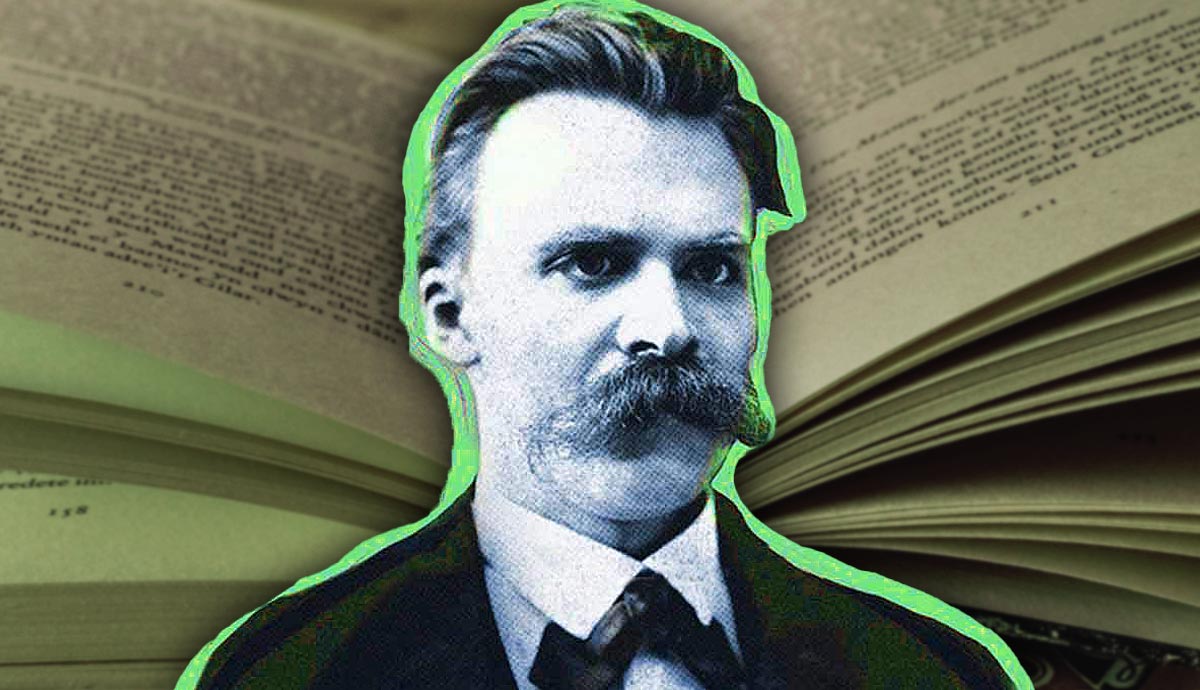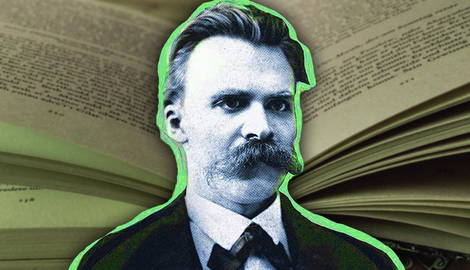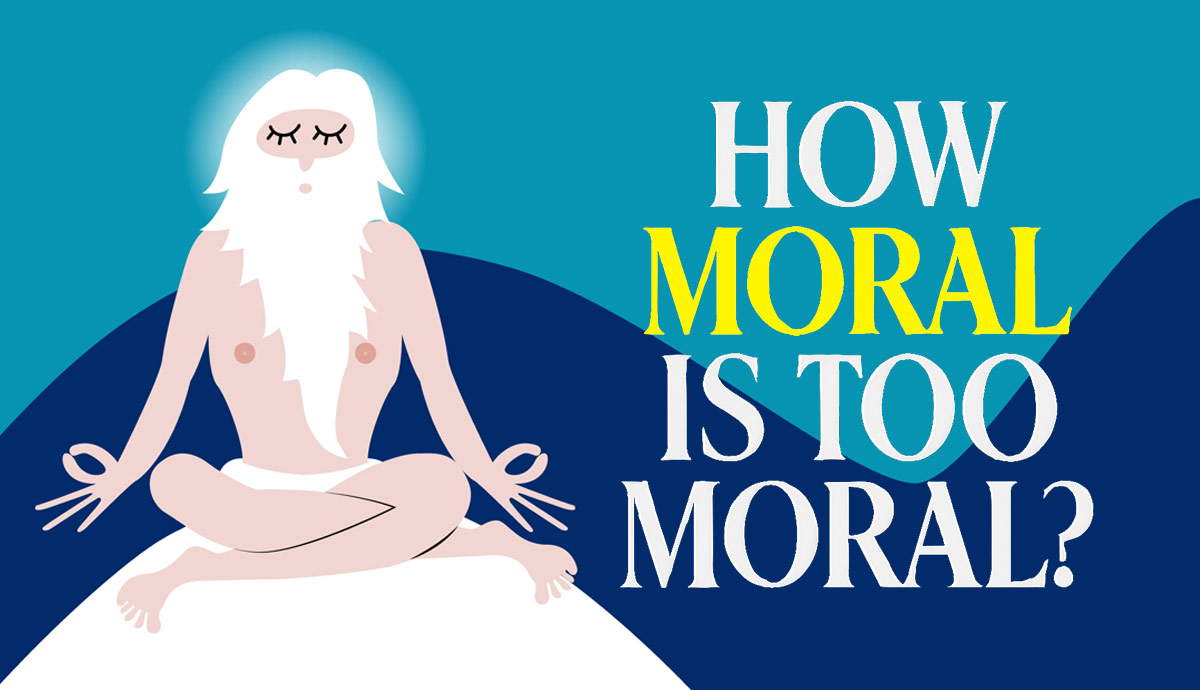
Friedrich Nietzsche was one of the towering figures in philosophy, whose lasting mark on the late 19th and early 20th-century intellectual landscape left a distinctive imprint. Known for his unorthodox views and provocative ideas, Nietzsche’s works continue to capture readers, scholars, and thinkers alike.
Nietzsche’s writings elaborate the following philosophical ideas: nihilism, master-slave morality, perspectivism, eternal recurrence, and Übermensch (Superman). He criticized traditional values and societal institutions while advocating for individualism and self-overcoming.
So let us explore Nietzsche’s philosophical journey by looking into all the important books that explain his intellectual development.
Human All Too Human, 1880

One of Nietzsche’s first and most important books, Human, All Too Human, is a collection of aphorisms and reflections published in three parts between 1878 and 1880. It represents an important stage in Nietzsche’s philosophical career as he distanced himself from the idealism of his earlier works towards a more skeptical, critical view.
- In the first section of the book, “Of the First and Last Things,” Nietzsche covers a wide range of topics: from science, to philosophy, culture, and human existence. He challenges traditional religious beliefs and makes an assertion that man has made religion as a way to cope with their fears and uncertainties. Besides, Nietzsche argues for the importance of reason and rationality to understand the world, abandoning dogmas of religion in favor of empirical inquiry.
- In “History of the Moral Feelings,” the second part, Nietzsche turns his attention to morality and ethics. He engages in a critical examination with respect to the origins of moral values and seeks to unveil their underlying psychological motivations. He argues that moral values are not universal truths but rather societal constructs shaped by power dynamics as well as individual perspectives. This critique undermines traditional notions of good and evil and posits them as largely subjective notions conditioned culturally.
- In the third section, “The Religious Life,” he dissects religious systems, particularly Christianity, saying they perpetuate a life-denying mentality rather than opening people up to fill the challenges of life with fullness. To him, religion is an impediment to personal growth and freedom because it demands conformity over individual self-realization.

Throughout Human, All Too Human, Nietzsche takes on a kind of scientific approach to philosophy. This work establishes the context for many themes that would continue to pervade Nietzsche’s later writings, such as nihilism, perspectivism (the theory that knowledge is always tied to one’s perspective), and the importance of embracing life’s contradictions.
The Gay Science, 1882

The Gay Science, the 1882 masterpiece by Nietzsche, is an invigorating and heterogeneous conglomerate of aphorisms, poems, and reflections that explore life’s complexities and contradictions.
Amongst the major themes explored in The Gay Science is that life should be embraced enthusiastically and joyously, even amidst its challenges and uncertainties. Nietzsche encourages individuals to engage with life courageously, embracing both its highs as well as lows. He contemplates the notion of “amor fati” which translates to “love of fate.” This philosophy urges us not only to accept but also to love our destiny by finding meaning even in suffering.
Another distinctive feature of The Gay Science is the explanation of truth and knowledge. Nietzsche rejects traditional common views that consider truth as an objective reality available only via rational thinking. Instead, he asserts a more varied view called perspectivism—the notion of conceiving truth as always subject to our viewpoints. There are no absolute truths, according to Nietzsche—they emerge from individual perceptions.
The book also celebrates the notorious proclamation: “God is dead.” With this daring statement, Nietzsche disparaged religious dogmas and stated that society had grown enough out of its dependence on obsolete religious frameworks. But instead of nihilism or despair without traditional beliefs, Nietzsche urges for humanity to become creators of their own values. He encourages people to make their own paths and find meaning without being dependent on external sources such as religion or societal norms.
The unconventional structure and snappily energetic style make The Gay Science a really enthralling read. Nietzsche’s gift for intermingling profound insights with wit and provocation ensures readers are challenged at every turn.
Thus Spoke Zarathustra, 1883

Thus Spoke Zarathustra was published in 1883 and is the most famous of Friedrich Nietzsche’s works. Described as a series of philosophical allegories, it tells the story of Zarathustra, a mythical prophet who descended from his mountain retreat to communicate his wisdom to mankind.
In the very heart of Thus Spoke Zarathustra is found this idea of Übermensch or “Superman” or “Overman.” Nietzsche depicts this visionary as the highest point in human potential—the breaker of traditional morals and practices that created his own value systems. The distinctions between right and wrong, good and bad, have no meaning for the Übermensch. They make their own value system by seeking individual excellence.
Zarathustra’s teachings arouse conventional beliefs about good and evil. According to Nietzsche, morality is not fixed but rather the product of human creation. He encourages individuals to put aside concepts of guilt and punishment inherited from religion. For him, liberation lies in acknowledging and owning one’s own desires while bearing full responsibility for their consequences.
Besides that, the book also establishes the idea of eternal recurrence, where Zarathustra reveals to his disciples that life has to be accepted fully and repeatedly without any regrets. It asserts that all events that we experience will recur infinitely throughout eternity. Nietzsche sees this concept as a test: if one were to accept every event in their lives with complete acceptance and joy, then they have attained true liberation.
In addition, Thus Spoke Zarathustra demonstrates the nature of seeking the meaning of life. According to Nietzsche, no meaning can be extracted from the outside; rather, realization comes from grasping the contradiction inherent within life itself.
Nietzsche’s provocative prose and visionary allegories paint an engaging exploration of the human condition. The reader is challenged to transcend societal constraints and forge their own paths toward self-realization and personal growth.
Beyond Good And Evil, 1886

Another one of Nietzsche’s major works, Beyond Good and Evil was written in 1886 and provides his most focused attack on traditional moral and philosophical systems. In it, Nietzsche questions the good/evil dichotomy that dominates Western thought. He states that these concepts are not fixed or universal but rather subjective constructs fashioned out of cultural norms and prevailing power dynamics.
Nietzsche states that morality is a human interpretation as opposed to an absolute truth that is imposed upon us. Morality, according to him, cannot be divorced from individuality, freedom of will, or desire: they are basic forces in one’s actions.
Beyond Good and Evil introduces the element of the “will to power”—an elemental force in human behavior. According to Nietzsche, all living beings have an inner drive for self-affirmation and domination over their environment. This philosophy deconstructs altruism and highlights the importance of personal autonomy and ambition in shaping one’s destiny.
Also, in this book, Nietzsche resorts to the aphoristic style—using short yet intense observations—whereby readers are left to ponder each maxim individually while constructing a thorough picture of his ideas. His polemical statements strike both awe and controversy within readers, propelling them into forming their own beliefs.
Beyond Good and Evil is a philosophical “call to arms:” a summons for people to reconsider unquestioned assumptions of truth, morality, and authority. It invites people to examine uncomfortable truths about themselves and society as a whole.
In other words, Beyond Good and Evil is an intellectual battlefield on which Nietzsche fights complacency—a manifesto urging us out onto an endless quest for knowledge, leading us towards asking difficult questions without shying away from “hard” answers.
On The Genealogy Of Morality, 1887

The Genealogy of Morality was written by Friedrich Nietzsche in 1887. This is a relentless critique of traditional moral values, which constitutes a deep examination of the origins and development of human morality. In this provocative work posed as an inquiry into human culture, Nietzsche sets himself to unravel the complex genealogical roots behind our moral beliefs and throws light on how they shape our understanding of good or evil.
The book is divided into three essays. Each essay explores one aspect of morality.
- In the first essay, Nietzsche deconstructs the concept of “good.” He traces the idea to power and superiority. He argues that morality initially arose from a master-slave dynamic—those in positions of power created definitions of good that would serve their own interests and subjugate others.
- In the second essay, “Guilt, Bad Conscience, and Related Matters,” Nietzsche explains the psychological mechanisms of morality. He says that guilt appears as a product of social pressure, conditioning people to suppress their natural instincts. In an alternative point of view suggested by Nietzsche, he says if one can live with desires without guilt or shame, then one will achieve personal growth and self-realization.
- Finally, in the third essay, “What Do Ascetic Ideals Mean?” Nietzsche examines asceticism as a vital element of moral systems. He states that ascetic ideals—self-denial, renunciation, and discipline—have been propagated by cultures for centuries as a means to control people and keep social order. Yet he thinks these ideals, at last, prevent the human potential for creativity and pleasure.
This riveting work asks fundamental questions about human nature: Who decides what is good or evil? How does morality shape our lives and direct our actions? Nietzsche’s inquiry into such deep matters makes readers confront their own moral beliefs, as well as consider the constructive possibilities that emerge in breaking down convention.
Twilight Of The Idols, 1888

In Twilight of the Idols, published in 1888, Nietzsche launches a scathing critique of various aspects of Western culture. This work is characterized by its provocative, audacious style.
One of the central themes in Twilight of the Idols is the notion of “ressentiment,” which describes feelings of resentment towards those in power and towards creativity. Nietzsche says that this ressentiment breeds reactionary thoughts or concepts that desire to uproot those who are powerful and creative. According to him, such a mentality leads to societies where mediocrity is valued above excellence.
Another central theme in Twilight of the Idols is the rejection by Nietzsche of conventional notions regarding morality. He advocates for a reevaluation of moral standards, arguing for one’s embrace of an individualistic approach to morality where the action is guided by personal experience and desires rather than notions imposed on society by religion or notions handed down from adults.
Again, here, Nietzsche has employed his concept of “will to power.” He believes that all living creatures are propelled by an inherent desire for power which manifests itself collectively under the heading of striving for success or seeking control over others. According to Nietzsche, this will to power is at the basis of human nature and acts as a driving force behind individual development and achievement.
Twilight of the Idols also discusses both Nietzsche’s critiques of Christianity as well as its direct influence on Western civilization. He is vehemently opposed to what he perceives as Christian nihilism that promotes self-denial and weakness in morals instead of life with its inherent joys and challenges.
The Antichrist, 1895

The Antichrist was published in 1895. It is among Friedrich Nietzsche’s most controversial, as well as polemical, works. Nietzsche started conceiving this work in 1888. This period also saw Nietzsche suffer from a mental breakdown which marked the end of his active philosophic career. The book harks back to his rejection of Christianity and offers scathing critiques not only regarding its morality but also its teachings.
Not wasting any time at all, Nietzsche immediately launches into provocatively titled territory with the very title itself. By framing his work as “The Antichrist,” he identifies himself as an actual adversary to Christ. Still, Nietzsche is more interested in unearthing what he feels are the faults within Christian doctrine.
In substance, The Antichrist analyzes Christian values and argues that they damaged humanity. According to Nietzsche, the morality of Christianity is based on weakness, resentment, and self-denial. He maintains that this morality has weakened individuals and societies because it promotes an attitude of obedience to authority figures and suppresses natural human instincts and desires as well.
In The Antichrist, Nietzsche also traces the origin of historical characters like Socrates and Paul of Tarsus. He portrays Socrates as the corruptor leading philosophy astray by stressing rationality over instinctual wisdom. Concerning the apostle Paul, he accuses him of imposing a distortion in Jesus’s teachings to create a religion that propagates slave morality—a value system centered on meekness and submissiveness.
To call The Antichrist a major work within Nietzsche’s philosophical career would be an understatement. Yet, it was extremely critiqued upon its release and remains controversial today. It constitutes a total condemnation of religious dogma and an incisive look at alternate perspectives on morality and human nature.
Ecce Homo, 1888

Ecce Homo, or “Behold the Man,” is Friedrich Nietzsche’s autobiography and last completed work. It was finally published in 1888 after being kept away for several years. In this amazing book, Nietzsche gives a far-reaching account of his life, beliefs, and achievements—all presented with his characteristic wit and brilliance.
The foundations of Ecce Homo start from Nietzsche’s wish to reflect on what he thought was his life’s work as well as an assessment of his philosophy. It is both a retrospective exploration and an explanation of various stages within his intellectual journey. Nietzsche felt that to understand the worth and importance of his ideas for humanity, he must first understand his own life.
Among the major themes addressed by Ecce Homo is a radical self-confident person who breaks conventional norms and values. It’s clear that Nietzsche considered himself a transformative figure whose philosophy’s purpose is to try and overthrow old beliefs/values and pave the way for new, positive values.
One theme Ecce Homo has in common with Nietzsche’s other works is another “attack” on Christianity. He blames Christianity for many societal ills because of the emphasis on weakness, pride, conformity, and denial of individual desires. Through vivid reflections on his earlier works, such as Thus Spoke Zarathustra and The Genealogy of Morality, he offers alternative visions for human existence founded on strength, creativity, power, and personal development.
Another prominent feature of Ecce Homo is the style that Nietzsche employs in writing. He uses an autobiographical approach rich with poetic language, aphorisms, irony, exaggeration, and sometimes even self-mockery. He challenges the reader to engage interactively with his ideas in a unique and thought-provoking way.
Nietzsche Contra Wagner, 1888

Nietzsche Contra Wagner was published in 1888 and is yet another fascinating late work that speculates upon the complex relationship between Friedrich Nietzsche and Richard Wagner. In this book, Nietzsche expresses a deep-seated discontentment and disillusionment with the music of Wagner as well as with Wagner himself.
The origin of Nietzsche Contra Wagner can be traced to their earlier close friendship; first, according to him, he had felt like a brother to Wagner—an artist who had broken all those shackles of conventional aesthetics. But in time, their ideological differences became increasingly apparent.
At its core, Nietzsche Contra Wagner is not merely an attack on the musical compositions of Wagner but an exploration of the profound philosophical disagreements between them. In Nietzsche’s eyes, in Wagner’s music, he found jubilation over decadence and affirmation of what he calls “the will to negate life.”
Nietzsche blames Wagner primarily for being swayed by the cultural pressures surrounding him and allowing his artistic vision to be diluted by outside influences. Nietzsche also blames the way in which Wagner employs massive musical grandeur as well as epic themes as a mere distraction from more “deeply existential” questions regarding human life.
Further, Nietzsche finds it deplorable what he sees as Wagner’s embracement of anti-Semitic sentiments and nationalist sentiments for personal gain—a factor that becomes rather meaningful considering that at this time period, Germany was seeing rising nationalism and anti-Semitism.
In Nietzsche Contra Wagner, we see how Friedrich Nietzsche wrestles with disillusionment—a realization that someone he used to respect very much has now become representative not only of artistic differences but also deeper moral conflicts.
The Birth Of Tragedy From The Spirit Of Music, 1872

In 1872, Friedrich Nietzsche published his first major work, The Birth of Tragedy from the Spirit of Music. The book looks at the origin stories behind Greek tragic drama and how crucial it is in gaining an understanding of human existence.
Nietzsche begins this work by looking at the opposition between two artistic principles: the Apollonian and Dionysian. The Apollonian stands for order, harmony, and rationality, while the Dionysian embodies passion, ecstasy, and irrationality. For Nietzsche, ancient Greek tragedy has merged these two elements into substantial insights into life’s complexities.
For Nietzsche, Greek tragedy appeared as a reaction to the unbearable reality of existence. The human condition is characterized by suffering and chaos, but tragedy helps individuals transcend their suffering by offering aesthetic catharsis. Through music, dance, and poetry in tragedy’s mix, individuals can experience a temporary release from their personal struggles and even move outside toward something greater than themselves.
In Nietzsche’s opinion, The Birth of Tragedy was not simply artistic expression alone; it had wider cultural implications. He says that modern society has become too highly rationalized and is out of touch with its fundamental Dionysian instincts. In excluding this inner chaos from our lives, we have evolved a contrived order that chokes creativity and stifles real human experience.
The Birth of Tragedy was met with much suspicion from the academic milieu at the time, yet it laid important foundations for Nietzsche’s later works. He introduces his conceptual framework for how art, culture, and the human condition relate to one another. By exploring where Greek tragedy originally came from, Nietzsche lays deep truths about existence and reveals just how there is that same tension between order and chaos that lies underneath every human endeavor.
Philosophy In The Tragic Age Of The Greeks, 1873

In the work Philosophy in the Tragic Age of the Greeks, Friedrich Nietzsche talks about some of the philosophical ideas and outlooks of important characters during ancient Greek times. Published in 1873, these ancient Greek philosophers were to be presented to generations as flawless individuals whose views on life and existence were relevant and worthy of being respected and appreciated.
One philosopher explored is Thales, who proposed that water is the ultimate origin of all things. Three reasons are listed by Nietzsche why this idea should be considered a serious proposition: it offers a statement about the primal source of everything, it avoids mythical or fictional language, and it reflects a vision that sees all things as fundamentally interconnected.
Another figure that the philosopher considered is that of Anaximander, who believed in the emanation of existing things from an undifferentiated source (apeiron) and, ultimately, return to it. He thus held that individual existence is, by nature, unjust or has no worth in itself. His way of life was therefore reflected in his philosophy, marked with a dignified, solemn demeanor.

Heraclitus offered a contrasting perspective, emphasizing continuous change as the natural order rather than perceiving injustice or guilt in it. According to him, reality demonstrates a fixed regularity amongst the constant flux. Heraclitus wittingly made paradoxical statements based on his observations of a world conditioned by constant variations.
Parmenides, according to Nietzsche, departed from the views presented by Heraclitus with his doctrine that stressed pure logic above sensory experience. He asserted that being is immutable, while the senses are deceptive. Parmenides argued that true reality lies in the realm of thought, where logic prevails over the ever-changing nature of sensory perception. In Nietzsche’s interpretation, being as portrayed by Parmenides was a subjective instead of an objective truth.
Anaxagoras also agreed with Parmenides in denying nothingness and the principle of becoming. He believed that out of infinitely many distinct prime substances, all things originate and intermingle. Anaxagoras speaks about “nous”, a mind or intelligence, as the first cause behind all later changes in the universe. Rather than attributing ethical or moral properties to this creative force, Nietzsche saw it as a mechanical and arbitrary process driven by playfulness.
Untimely Meditations, 1876

Untimely Meditations, published in 1876, is a collection of four essays offering a restricted view into Nietzsche’s early philosophical development and thus preparing the way for his later works. Generally neglected as compared to his more recognized books like Thus Spoke Zarathustra or Beyond Good and Evil, Untimely Meditations remains a crucial resource for untangling Nietzsche’s evolving ideas.
In these essays, Nietzsche critically examines contemporary German culture and its conformity to societal expectations. He asserts that true intellectual development is only possible through the negation of prevailing conventions and a reassessment of values. Through different mediums, such as literature, philosophy, and history, Nietzsche seeks to challenge readers to reevaluate their assumptions about tradition, morality, and education.
The essay “David Strauss: The Confessor and the Writer” is one of the more interesting in this collection. In it, Nietzsche criticizes David Strauss’s book The Old Faith and the New for misguidedly trying to reconcile religion with rationality. He states that instead of seeking to harmonize opposing worldviews, intellects should engage in radical critique so as to unearth deeper truths.
Another interesting essay is “On the Uses and Disadvantages of History for Life.” In that piece, Nietzsche again challenges conventional historical scholarship oriented on accumulating facts about the past. He asserts that history should serve life by providing inspiration, lessons, and models for present-day existence. His call for a more life-affirming approach to history emphasizes its potential impact on shaping individuals’ values and actions.
Through Untimely Meditations, Nietzsche articulates his acute wit together with deep philosophical revelations. Each essay is an embodied argument, which adds to the general theme in Nietzsche’s work of critiquing conformity within society and motivating one’s search for truth and authenticity.
Human All Too Human, 1878

We have already touched upon Nietzsche’s famous work Human, All Too Human. However, there were two parts. The basic difference between Human, All Too Human (1878) and the subsequent edition published in 1880 lies in the additional content included in the later version.
In the 1878 edition, Nietzsche presents a collection of 638 aphorisms that range over topics from metaphysics to criticism of the Christian idea of good and evil. There are also reflections on religious worship and divine inspiration in art; social Darwinism discussion; analyses of the roles of men, women, and children in society; exploring state power; and finally, a section titled “Man Alone with Himself,” which turns inward to explore individuality.
Interestingly, in the version of Human, All Too Human, published in 1880, Nietzsche updates what he originally wrote by adding two further parts: Part II —408 aphorisms and Part III –350aphorisms. These further digressions build upon themes introduced within the first part whilst seeing beyond into new territory.
Such additions cover art and culture, science and knowledge, morality, freedom, love and relationships, religion’s command over human life, death, suffering, and solitude, among other life experiences. The inclusion of these later aphorisms widens our perspective on Nietzsche’s philosophy since it gives us deeper insights into what he thought about the above topics.
In general terms, though both editions have some similarities with respect to their content—such as Nietzsche’s criticism against religion and societal norms—the extended versions found in later editions provide readers with a deeper exploration of his philosophical ideas.
The Will to Power (& Why It’s Problematic)

Finally, right in the wide territory of philosophical works of Friedrich Nietzsche, The Will to Power towers as a lofty monolith. It is a book that goes into the depths of human nature and explores what lies behind our actions and ambitions. But with its undeniable allure comes a heavy dose of controversy and debate.
The Will to Power brings us, metaphorically speaking, on a journey through the search for power through Nietzsche’s exploration of the basic principle that underlies every form of human behavior: the challenge for power. This will to power is inborn in every facet of human life—from our most elementary instincts and loftiest aspirations. It is a force so powerful that it can mold not only individual lives but entire cultures and societies as well.
This manuscript fueled an intense debate and critique between scholars and readers alike. Some of them say that an emphasis on power within Nietzsche’s works supports selfishness and disregards ethical considerations, painting an even more terrifying picture of a world where ruthless ambition rules supreme.
Further, the book was compiled posthumously by Elisabeth Förster-Nietzsche, Nietzsche’s sister, who perhaps tampered with or misinterpreted his original manuscripts in order to further her pro-Nazi agenda. This has led some scholars to cast doubts about the truthfulness and originality of the work.
With these controversies, however, one could not deny the deep impact The Will to Power has had on philosophical discourse. It asks us to question our own desires for power and influence, thereby inviting us to introspect about our motivations and values.
Howsoever you may want to regard Nietzsche’s ideas presented in The Will to Power, what is clear—whether you embrace or challenge them—is that they remain entrancing catalysts of intellectual stimulation and spirited debate.
So, What Is Nietzsche’s Legacy?

In this “expedition,” we overviewed 13+1 books that shed more light on the intellectual development of Nietzsche. Every book in itself is significant as it offers a new perspective or dissects a different facet of his philosophy.
From “Thus Spoke Zarathustra,” with prophetic language and teachings, to “Beyond Good and Evil,” which examines prevailing moralities, every work adds another layer to our understanding of his complex worldview.
In these books, the overwhelming themes are Nietzsche’s challenges to basic questions about human nature and morality, religion, and knowledge quest for and examining conventional wisdom. He makes us confront uncomfortable truths that make us question not only societal conventions but also prevailing norms.
Nietzsche is a controversial thinker—but one can never deny the lasting effect he has had on philosophy in general. His writings still dole out generations of thinkers that seek deep insights into the human condition.










